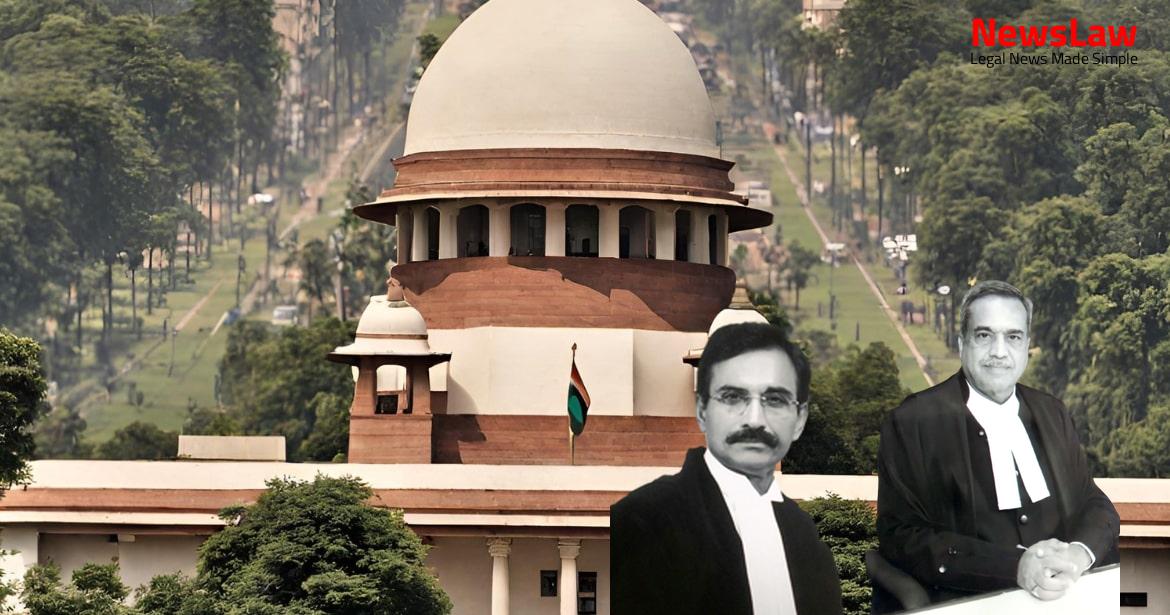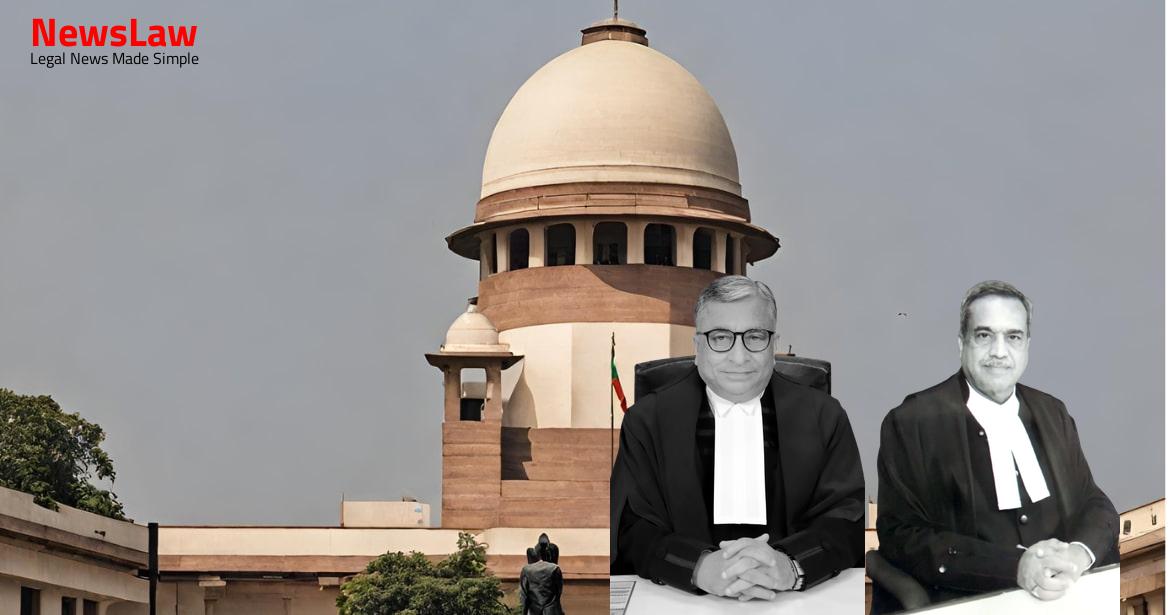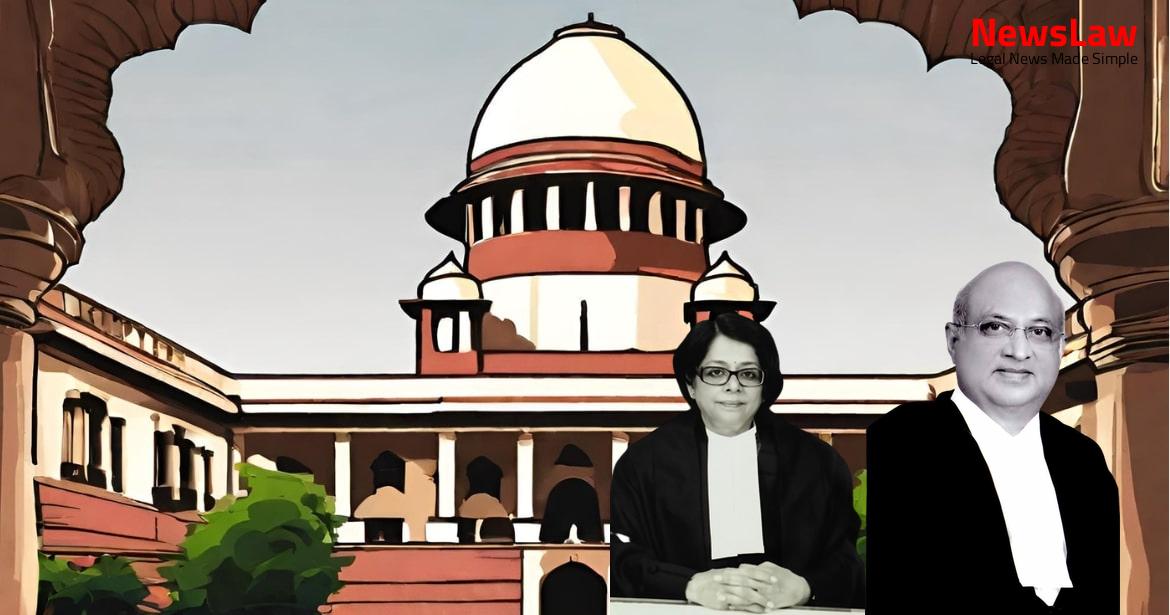In a significant legal development, the Supreme Court of India delivered a landmark judgment in the case involving Govind Jerale and Girish Kumar. The dispute revolved around the interpretation of recruitment rules governing promotions within the department. The court’s decision has far-reaching implications for similar cases and clarifies the distinction between seniority rules and recruitment rules. Let’s delve into the details of this important case and the implications of the court’s ruling.
Facts
- Govind Jerale appointed as Junior Assistant on 8.9.1994, promoted to Senior Assistant on 6.11.1999.
- Appellant Girish Kumar appointed as Senior Assistant on 26.6.2001.
- Appellant suspended in 1999, reinstated on 17.7.2001 after exoneration in departmental enquiry.
- Respondent No.3 appointed as Junior Assistant on 29.8.1994, promoted to Office Superintendent on 22.10.2007.
- Respondent No.3 granted 6.11.1999 as deemed date of promotion as Senior Assistant.
- Respondent No.3 promoted as Senior Assistant on 1.7.2006.
- Appellant filed writ petition challenging promotion of Respondent No.3 as Section Officer.
- Divisional Commissioner granted 07.10.2005 as deemed date of promotion as Office Superintendent for Respondent No.3.
- Appellant claimed Respondent No.3 ineligible for promotion to Section Officer citing eligibility criteria.
- Appellant appealed to Additional Divisional Commissioner, Aurangabad on 05.11.2008.
- Appellant preferred present appeal challenging promotion of Respondent No.3.
- A writ petition was filed by the Petitioner challenging the order of promotion of Respondent No.3.
- The Single Judge allowed the writ petition and set aside the order of the Additional Divisional Commissioner.
- Respondent No.3 filed a Writ Petition against the order of the Additional Divisional Commissioner.
- The Division Bench confirmed the Single Judge’s decision and dismissed the appeal filed by the Petitioner.
Also Read: Supreme Court Ruling on Dowry Harassment and Suicide Case
Issue
- The main issue before the Court is whether an employee who has been given a deemed date of promotion but has not actually worked in the promotional post can be considered to have completed the required service in the feeder cadre.
- The question pertains to the interpretation of the relevant Recruitment Rules and Seniority Rules.
- Specifically, the Court needs to determine if the deemed date of promotion can be equated to actual service in the promotional post for the purpose of fulfilling the three-year service requirement in the feeder cadre.
Also Read: Case of Technical Equipment Officer Appointment Criteria Dispute
Arguments
- The appellant’s advocate argues that the High Court did not properly distinguish between the Seniority Rules, 1982, and the Recruitment Rules, 1967.
- The advocate asserts that the Seniority Rules, 1982 apply to seniority, not recruitment, and the promotional eligibility criteria are governed by the Recruitment Rules, 1967.
- The appellant’s advocate emphasizes the importance of the completion of three years of continuous service as a requirement for promotion to the post of Section Officer.
- The advocate points out that the term ‘continuous service’ is a technical term in service jurisprudence and must be adhered to in this case.
- There is a strong opposition to the argument that ‘continuous service’ in the Recruitment Rules, 1967 should be equated with ‘actual service’ in the feeder cadre.
- It is argued that the High Court’s reliance solely on Rule 5 of the Seniority Rules, 1982 without considering the requirements of the Recruitment Rules, 1967 was erroneous.
- Failure to consider the relevant provisions of the Recruitment Rules, 1967 led to an interpretation that could render the Seniority Rules, 1982 absurd and unworkable.
- The High Court is criticized for not evaluating the eligibility criteria specified in the Recruitment Rules, 1967 for promotion to the post of Section Officer.
- The advocate contends that the appellant’s failure to challenge the deemed date of promotion to respondent no.3 for the post of Senior Assistant should have consequences.
- The learned Senior Advocate for the respondent argues that the views of the learned Single Judge and Division Bench of the High Court are plausible.
- The interpretation of State Law is at the core of the issue.
- The interference of the Supreme Court under Article 136 of the Constitution of India is deemed unnecessary.
Also Read: Supreme Court Judgement on Transfer of Mining Environmental Clearances
Analysis
- The High Court added the word ‘actual’ in the interpretation of the eligibility criteria for promotion, which was not present in Appendix IX of Recruitment Rules, 1967.
- Deemed date of promotion granted to the employee for inter se seniority does not alter the eligibility criteria stated in the Recruitment Rules.
- The Seniority Rules, 1982 and the Recruitment Rules, 1967 operate in different fields with the former governing seniority and the latter governing recruitment.
- The term ‘continuous service’ in Appendix IX of the Recruitment Rules, 1967 requires uninterrupted or unbroken service for a period of three years for eligibility to the promotional post of Section Officer.
- The Recruitment Rules, 1967 are based on Article 309 of the Indian Constitution and are empowered by the Maharashtra Zilla Parishads and Panchayat Samities Act, 1961.
- The lack of a defined term for ‘continuous service’ in the Recruitment Rules indicates that the ordinary meaning of ‘uninterrupted or unbroken’ applies.
- While the Seniority Rules may define ‘continuous service’, it does not affect the eligibility criteria set forth in the Recruitment Rules.
- A fair reading of Appendix IX establishes that fulfilling the three-year continuous service requirement is necessary for promotion to the post of Section Officer.
- The High Court failed to consider the crucial evidence presented by the Petitioner.
- It overlooked the clear precedents in similar cases that support the Petitioner’s argument.
- The High Court misinterpreted several key legal principles which led to its erroneous decision.
- It did not give due weight to the expert testimonies provided by the Petitioner.
Decision
- The present appeal succeeds
- Additional Divisional Commissioner, Aurangabad rightly allowed the appeal and set aside the order of promotion dated 1.2.2008
- Impugned judgments and orders by the High Court are quashed
- Order of the Additional Divisional Commissioner, Aurangabad dated 20.05.2010 is restored
- Original decision on promotion to the post of Section Officer is upheld
- No costs awarded in the circumstances of the case
Case Title: GIRISH KUMAR Vs. STATE OF MAHARASHTRA
Case Number: C.A. No.-004894-004894 / 2019



